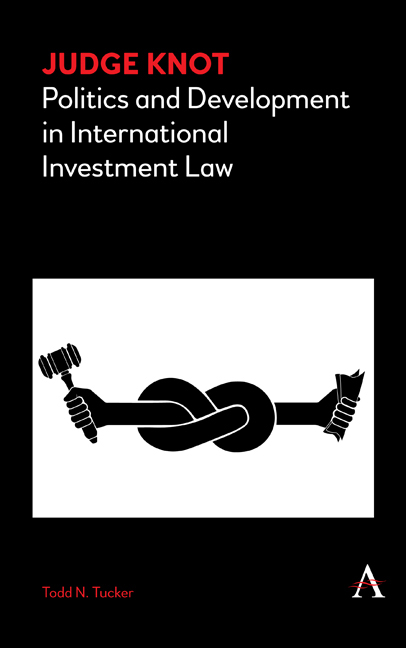Book contents
- Frontmatter
- Dedication
- Contents
- List of Illustrations
- Acknowledgments
- Introduction
- Chapter One Entering the Judge Knot
- Chapter Two Historicizing Investment Law
- Chapter Three Why Investors Demand Investment Law
- Chapter Four Why Arbitrators Supply Investment Law
- Chapter Five Why Investment Law Lasts
- Chapter Six Toward Global Popular Constitutionalism
- Appendix Methodology
- Index
Chapter One - Entering the Judge Knot
Published online by Cambridge University Press: 21 June 2018
- Frontmatter
- Dedication
- Contents
- List of Illustrations
- Acknowledgments
- Introduction
- Chapter One Entering the Judge Knot
- Chapter Two Historicizing Investment Law
- Chapter Three Why Investors Demand Investment Law
- Chapter Four Why Arbitrators Supply Investment Law
- Chapter Five Why Investment Law Lasts
- Chapter Six Toward Global Popular Constitutionalism
- Appendix Methodology
- Index
Summary
A company was able to sue a country over a public health measure through an international court. How the fuck is that possible? […] You've got to give it to them. That's impressive. Someone should really give those lawyers a pat on the back. And, a punch in the face. But […] a pat on the back first. Pat, then punch. Pat, punch. They need a pat, punch. Little pat, big punch. That's what they need.
—Comedian John Oliver (2015)All Tangled Up
Did you hear the one about the billionaire, the nun and the lawyers? It is not a joke, but a story that reveals the enormous complexities of our international system for governing cross- border investment. The tale will take us from Manhattan to Missouri, from the Cayman Islands to Peru and back to the United States, showing us how any local investment dispute has the potential to go global.
Meet Ira Rennert. Once banned from the US securities brokerage business for taking excessive risks with his clients’ money, the American financier went on to become one of the country's foremost buyers of distressed businesses. From smelters in Missouri to coal- pulverizing plants in Kentucky to magnesium pits in Utah, Rennert had an eye for finding floundering businesses and buying them up at bargain- basement prices. He financed the deals through junk bonds—loans in the newly acquired company's name (Thornton 2003). This brought cash in the door quickly but saddled the companies he acquired with heavy debt burdens for years to come. Rennert would gradually strip down and sell these companies’ useable assets. Sooner or later, these businesses’ stock prices would plummet or they would go into bankruptcy, and Rennert would jump ship and move onto the next deal (Elstein 2011; Shinkle and Lambrecht 2002).
His business acumen made him fabulously wealthy. According to Forbes Magazine (2017), he is worth more than $4 billion, making him one of the richest men in the world. His house in the Hamptons on Long Island is the largest private residence in the United States, valued at $500 million and taking up more than 100,000 square feet. The mansion boasts a dining room table the length of a baseball diamond, 21 bedrooms, and a Broadway- size theater (Crowe 2015).
- Type
- Chapter
- Information
- Judge KnotPolitics and Development in International Investment Law, pp. 7 - 22Publisher: Anthem PressPrint publication year: 2018



